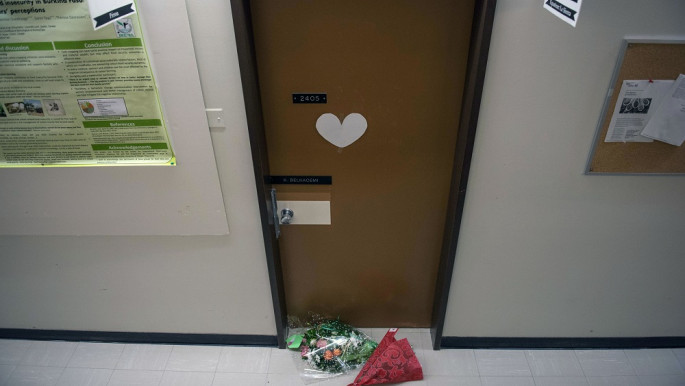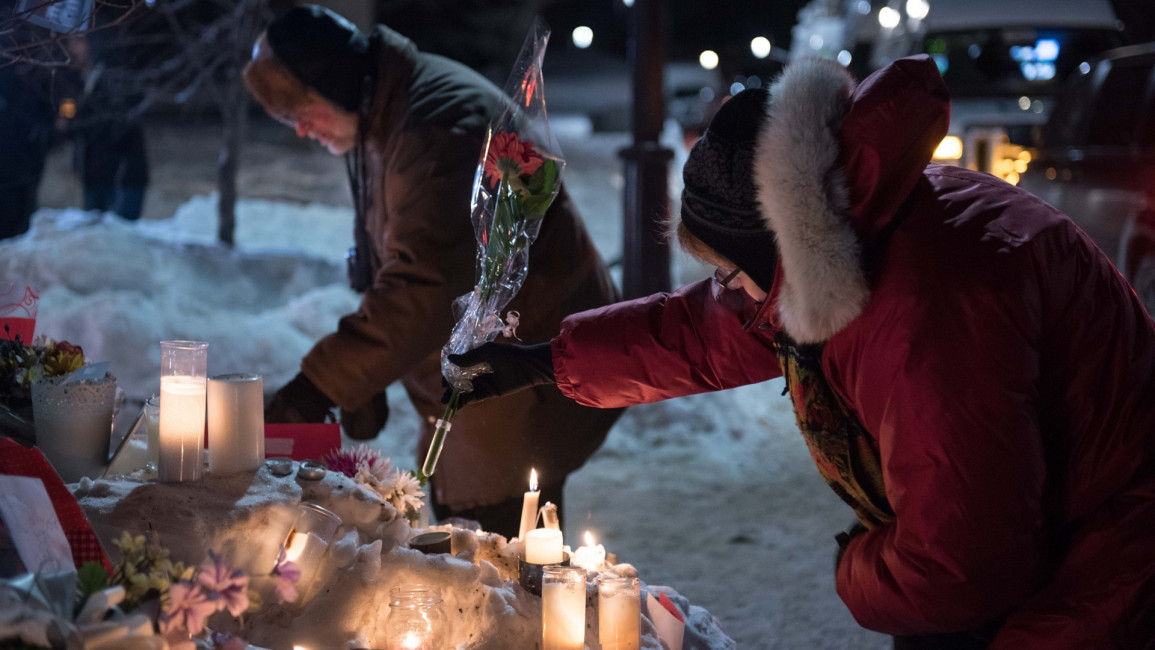Fear and anxiety as Quebec-mosque survivors in critical condition
The shooting killed six Muslim-Canadians, who were later found to be all immigrants from Africa. Two were from Algeria, two from Guinea, and two victims were from Morocco and Tunisia. Nineteen were injured in total in the attack.
The five men taken to hospital on Sunday evening are expected to survive, according to Canada’s CTV News which quoted medical sources, but two of the men remain in critical condition.
One of them, named as Tunisian-Canadian Ayman Derbali [AR], underwent surgery on Tuesday at l'Enfant-Jesus hospital to repair damage caused by bullets and fragments.
Derbali, a father of three, suffered five gunshot wounds and risks being paralysed, according to Canadian press reports. He could spend two weeks in intensive care, said Tunisia’s ambassador to Canada Riadh Essid in a radio interview on Tuesday.
Essid confirmed the attack on the mosque had killed a Tunisian-Canadian dual national, 44-year-old Boubaker Thabti, and injured two others, Derbali and Nizar Ghali, who is said to be in a stable condition. The ambassador told reporters his country would be closely following investigations with the Canadian authorities and provide assistance to its affected citizens.
The body of Boubaker Thabti will be repatriated to his hometown, his brother Hassan told The New Arab, where it will be buried in Tataouine in southern Tunisia.
However, the bodies of the slain continue to be held by the coroner and will all undergo autopsies in Montreal, reported CTV News on Tuesday.
 |
| Flowers are placed in honour of Professor Khaled Belkacemi, one of the shooting victims [AFP] |
A Toronto business has since offered to pay for the funerals of those killed in the attack. In a press release on Tuesday, Islamic Relief Canada said that Etobicoke-based Paramount Fine Foods has offered to pay for funeral costs and construction costs to repair damage at the Quebec Islamic Cultural Centre.
African immigrants
The six men who were killed in the attack were all Muslim immigrants from Africa, according to OkayAfrica.
They were named as Azzeddine Soufiane, 57, originally from Morocco; Khaled Belkacemi, 60, and Abdelkrim Hassane, 41, from Algeria; Ibrahima and Mamadou Tanou Barry, 39 and 42, from Guinea; and Boubaker Thabti, 44, from Tunisia.
|
Azzeddine Soufiane emigrated to Quebec City to attend Laval University.
“He was almost like the president of the [Moroccan] community. He helped and guided all the people who arrived here – students, families,” said a member of his Moroccan community group.
Khaled Belkacemi was a professor at Laval University.
Abdelkrim Hassane worked as a programmer for the Quebec government. “He had two young children who waited in vain for their father to return home,” according to a co-worker.
Ibrahima Barry worked for the health insurance board and had four young children, and Mamadou Tanou Barry was an IT worker who left behind two sons.
Boubaker Thabti, 44, was a pharmacy worker from Tunisia. He had two children, ages 3 and 10.
Their death has left the Muslim community in Quebec reeling. "We are like a big, big family. We try to help each other. Each of these six deaths is like a death in the family," said Mohamed Labidi, vice-president of the mosque, the Centre Culturel Islamique de Quebec.
 |
The fatal shooting highlights the potential threat posed by violent extremism in Quebec and throughout Canada - HRW |
 |
‘Violent intolerance’
The terrorist attack took place at the Centre Culturel Islamique de Quebec at the end of evening prayers. Police say one man walked into the building and opened fire.
Alexandre Bissonnette was charged on Monday with six counts of first-degree murder and five charges of attempted murder. The 27-year-old is a Quebec nationalist and anti-feminist who recently "liked" US President Donald Trump's page on Facebook and has also reportedly expressed support for French far-right politician Marine Le Pen as well as the Israeli military and other far-right groups.
Prime Minister Justin Trudeau condemned the "terrorist attack" on the Islamic Cultural Centre in a busy district of Quebec City, which sent terrified worshippers fleeing barefoot in the snow.
The Quebec mosque had already been the target of hate: a pig's head was left on the doorstep last June during the Muslim holy month of Ramadan.
 |
| Click to enlarge |
The shooting came as Canada vowed to open its arms to Muslim refugees after Trump's controversial immigration ban prompted travel chaos and outrage around the world.
The brutal attack on worshippers at the Islamic Cultural Centre of Quebec “underscores growing concerns about violent intolerance against Muslims”, watchdog Human Rights Watch said on Tuesday.
The shooting highlights the potential threat posed by violent extremism in Quebec and throughout Canada, continued HRW, citing the increasing number of police-reported hate crimes against Muslims in Canada which more than doubled from 2012 to 2014.
“This fatal attack on a religious minority’s place of worship shows that even though Canada’s government has taken a strong public stand against xenophobia, there is still a real need to confront prejudice and the heightened threat of violence that comes with it,” said Farida Deif, Canada director at HRW.



